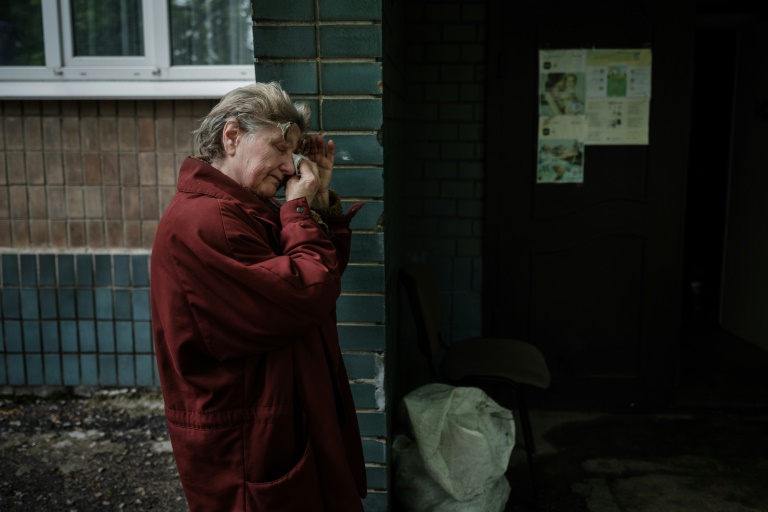The renewed Russian offensive in Ukraine’s Donbas has turned the eastern region into “hell”, President Volodymyr Zelensky said, as the United States approved a gargantuan $40-billion aid package for the country.
After failing to take Kyiv following the launch of the invasion in February, Russia has focused its attacks on the south and east of Ukraine, devastating towns and villages with artillery fire.
Moscow’s forces have been trying to take complete control of Donbas, a Russian-speaking area that has been partially controlled since 2014 by pro-Kremlin separatists.
“In Donbas, the occupiers are trying to increase pressure,” Zelensky said in his nightly address on Thursday.
“There’s hell, and that’s not an exaggeration.”
The defence ministry in Kyiv said Thursday that Russian forces were preventing civilians in Donbas from fleeing to Ukrainian-controlled territory.
In Severodonetsk, 12 people were killed and another 40 wounded when Russian forces shelled the eastern city, the regional governor said.
Severodonetsk and its sister city Lysychansk make up the last pocket of Ukrainian resistance in the smaller of the two regions comprising the Donbas war zone.
Russian forces have surrounded the two — split by a river marking a central front of the war — and are bombarding them to try and wear down resistance and starve residents of supplies.
The residents still in the now ghostly city are afraid to take more than a few steps outside their front door.
Nella Kashkina sat in her basement next to an oil lamp and prayed.
“I do not know how long we can last,” the 65-year-old said.
“We have no medicine left and a lot of sick people — sick women — need medicine. There is simply no medicine left at all.”
Zelensky on Thursday described the bombardment of Severodonetsk as “brutal and absolutely pointless”.
– Biden backs Finland, Sweden –
Ukraine’s allies, led by the United States and the European Union, have given billions of dollars in assistance — including military equipment — to Kyiv since the Russian invasion began on February 24.
The US Congress on Thursday approved a huge weapons and aid package worth $40 billion, and the White House said President Joe Biden would sign it during his trip to Asia.
The bundle includes $6 billion for Ukraine to enhance its armoured vehicle inventory and air defence system.
Biden has cast the Ukraine war as part of a great US-led struggle of democracy against authoritarianism.
At the White House on Thursday, he offered “full, total, complete backing” to Finland and Sweden in their bid to join NATO, giving the leaders of the Nordic neighbours a red-carpet welcome at the White House.
Finland and Sweden had historically kept a distance from the alliance to avoid angering Russia but changed course — despite warnings from the Kremlin — as the brutal invasion shocked Europe.
But all 30 existing NATO members need to agree on expanding the alliance, and Turkey has voiced misgivings about the new applicants, accusing them of what it describes as leniency towards armed Kurdish groups.
NATO Secretary General Jens Stoltenberg said the alliance was “addressing the concerns that Turkey has expressed”.
US Secretary of State Antony Blinken echoed that remark, saying: “I’m very confident that as this process moves forward, there will be a strong consensus for bringing both countries under the alliance.”
In Finland, a brewery produced a special NATO beer.
It tastes of “security, with a hint of freedom”, brewer Petteri Vanttinen said.
– ‘I ask you for forgiveness’ –
In southern Ukraine, 1,730 Ukrainian soldiers surrendered this week at the Azovstal steel plant in the port city of Mariupol, Russia said Thursday.
The Russian defence ministry released a video appearing to show exhausted Ukrainian soldiers trudging out of the sprawling steelworks, after a weeks-long siege forced the defenders and civilians to huddle in tunnels, enduring dire shortages of food, water and medicine.
Russian troops patted down those surrendering and inspected their bags as they left, signalling the effective end of what Ukraine’s government had called a “heroic” resistance.
The International Committee of the Red Cross said it had registered “hundreds of Ukrainian prisoners of war” from the plant in Mariupol, which has been obliterated by Russian shelling.
Ukraine is hoping to exchange the Azovstal soldiers for Russian prisoners.
But pro-Kremlin authorities in Ukraine’s eastern Donetsk region said some of them could be put on trial.
Kyiv has started trying captured Russian troops for alleged war crimes with prosecutors detailing 12,595 counts — including the horrific bombing of a maternity ward in Mariupol.
The first Russian soldier to go on trial in Ukraine begged for forgiveness Thursday.
Vadim Shishimarin has admitted shooting dead Oleksandr Shelipov, an unarmed 62-year-old man.
“I know that you will not be able to forgive me, but nevertheless I ask you for forgiveness,” the 21-year-old sergeant said to Shelipov’s widow.
– ‘We’re not idiots’ –
The conflict has sent shockwaves through the global economy, especially in energy and food markets.
Russia and Ukraine produce 30 percent of the world’s wheat supply and the war has sent prices surging. Russia is also a major exporter of fertiliser.
UN Secretary-General Antonio Guterres has warned that it could spark a food crisis that could last for years.
The United States and Russia blamed each other Thursday for the worsening food situation.
Washington called on Russia to allow exports of Ukrainian grain held up at Black Sea ports.
But separately, Dmitry Medvedev — Russia’s former president and now senior security official — said Thursday that the West should not expect Moscow to continue food supplies.
“On the one hand, insane sanctions are being imposed against us, on the other hand, they are demanding food supplies. Things don’t work like that, we’re not idiots,” he said on Telegram.
“Countries importing our wheat and other food products will have a very difficult time without supplies from Russia. And on European and other fields, without our fertilisers, only juicy weeds will grow.”
burs-qan/reb










